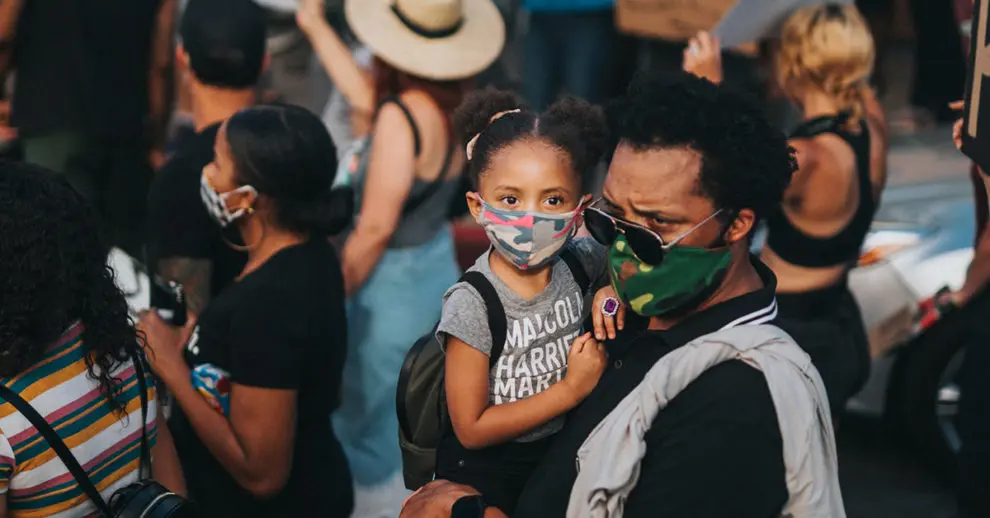
On November 9, 2020, United Nations member states gathered in person and virtually to evaluate the United States’ human rights record. This process, called the Universal Period Review (UPR), happens every four to five years for all UN member states. For the United States, the review came at a remarkable time, as countries evaluated the Trump Administration’s record and made recommendations that would be implemented by a Biden-Harris administration.
During the three-hour review process, certain themes came up again and again, many of them affecting children. Almost every country raised concerns about systemic racism, racial discrimination, and police brutality in America. Many countries called on the United States to end the sentence of life without parole for children. Countries repeatedly decried hateful rhetoric and policies against immigrants, particularly family separation and detention. Botswana and Myanmar voiced concern about the inequality of education based on race and socioeconomic status. Multiple countries noted that the U.S. has no central mechanism to implement human rights throughout the country. Notably, at least 44 countries called on the U.S. to ratify the Convention on the Rights of the Child (CRC), as it is the only country in the world that has not.
The CRC was adopted 31 years ago today, Nov. 20, which is also World Children’s Day. The treaty emanates from the principles of non-discrimination, best interest of the child, child survival and development, and child participation. It prohibits the sentence of life without parole for children. It states that immigrant families should be together and reunified — and that immigrants have rights that countries must protect. It outlines a right to an education that develops a child’s abilities, personality, and understanding of the world. In short, the Convention addresses all the child rights violations that advocates have cited time and again in the United States.
While the United States has not ratified the CRC, our country can still manifest child rights in our laws and policies. We can uphold the same principles by ensuring that our policies and procedures do not discriminate against children based on their race, gender, immigration, or any other status; consider the best interest of the child; protect child survival, development and well-being; and uplift and consider children’s voices. The recommendations released from the UPR process offer an opportunity for the new Biden-Harris administration and a new Congress to remedy the human rights violations of the past four years and bring human rights home for all of us. On this World’s Children’s Day, here are our recommendations for the United States government to respect and ensure the rights of children.
Racial Equity
- Prioritize the outcomes and experience of service users. The outcomes, experiences, and the expertise of communities harmed by racial disparities should play primary roles in system reforms.
- Develop and use race equity policy tools that acknowledge the history and context of policy proposals, include the perspectives of racialized and oppressed communities, identify potential disparate impacts, and analyze racially disaggregated data.
- Train and fund equity-focused data collection. Both national and local human services systems need ongoing training and funding to establish and maintain data technology systems that provide racially disaggregated data.
- Create culturally competent services and interventions that have been developed and tested in the diverse communities.
Juvenile Justice
- Monitor and address disproportionate contact between the police and youth of color by providing substantial funding and technical assistance to states and local juvenile justice agencies.
- Eliminate the solitary confinement of children and support behavioral health and restorative justice professionals in all facilities serving juveniles.
- Set a minimum age for juvenile court to ensure that young children are not experiencing a violation of international human rights.
- Protect kids’ Miranda Rights and reduce the number of false confessions by ensuring youth have legal representation before waiving their constitutional rights.
- Ban for-profit facilities, including detention and correctional centers.
Immigration
- Welcome children at the border by implementing orderly and humane border processing, providing for basic needs, and providing basic information about the immigration process.
- Protect family unity. End family separation unless there is imminent harm of risk to the child.
- Ensure the right to liberty. End family detention and institutionalized care for unaccompanied children by using family- and community-based case management.
- Guarantee fair immigration proceedings by providing all children with legal representation in their immigration cases.
- Restore asylum access and refugee resettlement for children and families.
- Prioritize child health and well-being by considering the best interests of children in all immigration policy decisions, including immigration enforcement actions and immigrant access to services.
Education
- Ensure universal access to adequate and equitable education without barriers based on class or race, disability or citizenship status, by prioritizing the funding of public schools over charter and voucher systems. Ban for-profit management of charter schools.
- End the use of harmful and exclusionary disciplinary practices like suspension and expulsion, which disproportionately target Black, brown, and indigenous children.
- Support culturally responsive and sustaining curriculums, as opposed to test-based standards.
- Provide suitable education for students with disabilities, English learners, and students in foster care and experiencing homelessness by expanding Title I funding.
- Expand social–emotional learning in schools to support student mental health.
- Desegregate schools as a necessary step toward civil rights in education.
Child Rights Mechanisms
- Establish an independent Children’s Commissioner to report and provide recommendations on advancing children’s rights, in consultation with children and youth.
- Create a White House Office of Children and Youth to facilitate interagency coordination on policies affecting child health and well-being.
- Establish a national best interest of the child standard.
- Require child impact statements for all policies that impact the health and well-being of children.

